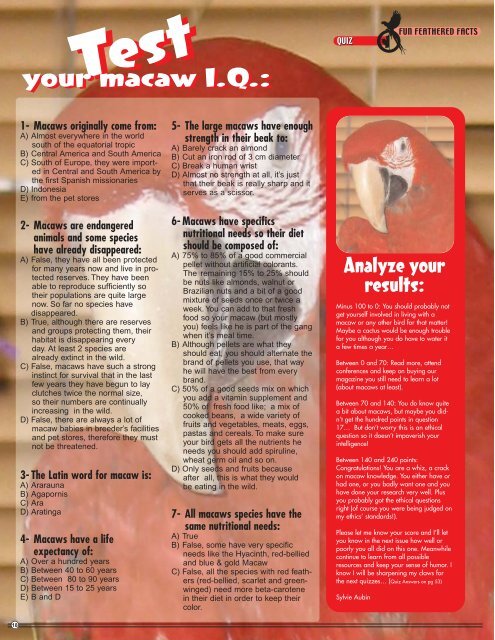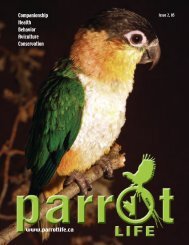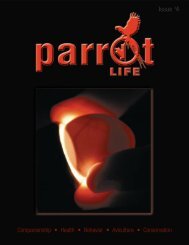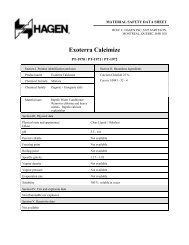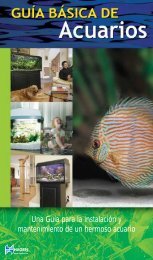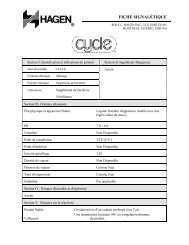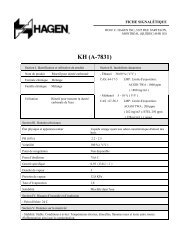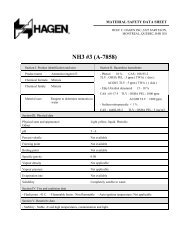parrotLife_Printers-3 (Page 1) - Rolf C. Hagen Inc.
parrotLife_Printers-3 (Page 1) - Rolf C. Hagen Inc.
parrotLife_Printers-3 (Page 1) - Rolf C. Hagen Inc.
You also want an ePaper? Increase the reach of your titles
YUMPU automatically turns print PDFs into web optimized ePapers that Google loves.
18<br />
1- Macaws originally come from:<br />
A) Almost everywhere in the world<br />
south of the equatorial tropic<br />
B) Central America and South America<br />
C) South of Europe, they were imported<br />
in Central and South America by<br />
the first Spanish missionaries<br />
D) Indonesia<br />
E) from the pet stores<br />
2- Macaws are endangered<br />
animals and some species<br />
have already disappeared:<br />
A) False, they have all been protected<br />
for many years now and live in protected<br />
reserves. They have been<br />
able to reproduce sufficiently so<br />
their populations are quite large<br />
now. So far no species have<br />
disappeared.<br />
B) True, although there are reserves<br />
and groups protecting them, their<br />
habitat is disappearing every<br />
day. At least 2 species are<br />
already extinct in the wild.<br />
C) False, macaws have such a strong<br />
instinct for survival that in the last<br />
few years they have begun to lay<br />
clutches twice the normal size,<br />
so their numbers are continually<br />
increasing in the wild.<br />
D) False, there are always a lot of<br />
macaw babies in breeder’s facilities<br />
and pet stores, therefore they must<br />
not be threatened.<br />
3- The Latin word for macaw is:<br />
A) Ararauna<br />
B) Agapornis<br />
C) Ara<br />
D) Aratinga<br />
4- Macaws have a life<br />
expectancy of:<br />
A) Over a hundred years<br />
B) Between 40 to 60 years<br />
C) Between 80 to 90 years<br />
D) Between 15 to 25 years<br />
E) B and D<br />
Test Test<br />
your macaw I.Q.:<br />
5- The large macaws have enough<br />
strength in their beak to:<br />
A) Barely crack an almond<br />
B) Cut an iron rod of 3 cm diameter<br />
C) Break a human wrist<br />
D) Almost no strength at all, it’s just<br />
that their beak is really sharp and it<br />
serves as a scissor.<br />
6- Macaws have specifics<br />
nutritional needs so their diet<br />
should be composed of:<br />
A) 75% to 85% of a good commercial<br />
pellet without artificial colorants.<br />
The remaining 15% to 25% should<br />
be nuts like almonds, walnut or<br />
Brazilian nuts and a bit of a good<br />
mixture of seeds once or twice a<br />
week. You can add to that fresh<br />
food so your macaw (but mostly<br />
you) feels like he is part of the gang<br />
when it’s meal time.<br />
B) Although pellets are what they<br />
should eat, you should alternate the<br />
brand of pellets you use, that way<br />
he will have the best from every<br />
brand.<br />
C) 50% of a good seeds mix on which<br />
you add a vitamin supplement and<br />
50% of fresh food like; a mix of<br />
cooked beans, a wide variety of<br />
fruits and vegetables, meats, eggs,<br />
pastas and cereals. To make sure<br />
your bird gets all the nutrients he<br />
needs you should add spiruline,<br />
wheat germ oil and so on.<br />
D) Only seeds and fruits because<br />
after all, this is what they would<br />
be eating in the wild.<br />
7- All macaws species have the<br />
same nutritional needs:<br />
A) True<br />
B) False, some have very specific<br />
needs like the Hyacinth, red-bellied<br />
and blue & gold Macaw<br />
C) False, all the species with red feathers<br />
(red-bellied, scarlet and greenwinged)<br />
need more beta-carotene<br />
in their diet in order to keep their<br />
color.<br />
QUIZ<br />
FUN FEATHERED FACTS<br />
Analyze your<br />
results:<br />
Minus 100 to 0: You should probably not<br />
get yourself involved in living with a<br />
macaw or any other bird for that matter!<br />
Maybe a cactus would be enough trouble<br />
for you although you do have to water it<br />
a few times a year…<br />
Between 0 and 70: Read more, attend<br />
conferences and keep on buying our<br />
magazine you still need to learn a lot<br />
(about macaws at least).<br />
Between 70 and 140: You do know quite<br />
a bit about macaws, but maybe you didn’t<br />
get the hundred points in question<br />
17… But don’t worry this is an ethical<br />
question so it doesn’t impoverish your<br />
intelligence!<br />
Between 140 and 240 points:<br />
Congratulations! You are a whiz, a crack<br />
on macaw knowledge. You either have or<br />
had one, or you badly want one and you<br />
have done your research very well. Plus<br />
you probably got the ethical questions<br />
right (of course you were being judged on<br />
my ethics’ standards!).<br />
Please let me know your score and I’ll let<br />
you know in the next issue how well or<br />
poorly you all did on this one. Meanwhile<br />
continue to learn from all possible<br />
resources and keep your sense of humor. I<br />
know I will be sharpening my claws for<br />
the next quizzes… (Quiz Answers on pg 53)<br />
Sylvie Aubin


